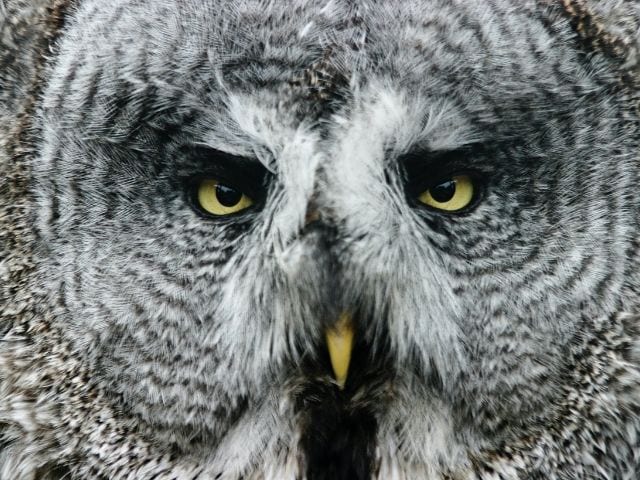Are you curious about the owl you spotted in your yard?
Do you hear weird noises and believe it's an owl but aren't sure which one?
Fortunately…
This article will reveal the types of owls in Michigan, how they sound, and the areas where they're likely to show up.
Let's go!
Introducing The 10 Owls of Michigan
1. Great Horned Owl
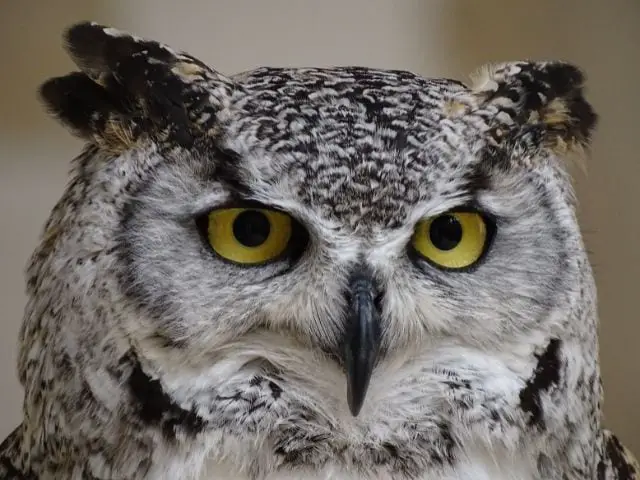
- Length: 18.1 to 24.8 inches
- Wingspan: 39.8 to 57.1 inches
- Weight: 910 to 2500 grams
The Great Horned Owl is the largest owl native to Michigan.
These 5-pound silent raptors terrorize creatures in their vicinity for survival. Mice, snakes, rabbits, frogs, and a variety of birds make up their diet.
As such, they can survive in any environment and have territories throughout the state. Great Horned Owls live in deserts, marshes, forests, and urban areas and are mostly seen perched on poles and atop buildings. Or roosting on a tree limb.
It's easy to recognize a Great Horned Owl by its size, but also its deep hoots.
Hear this mellow sound after dark? Then, "the Tiger Owl," must be lurking:
2. Eastern Screech Owl
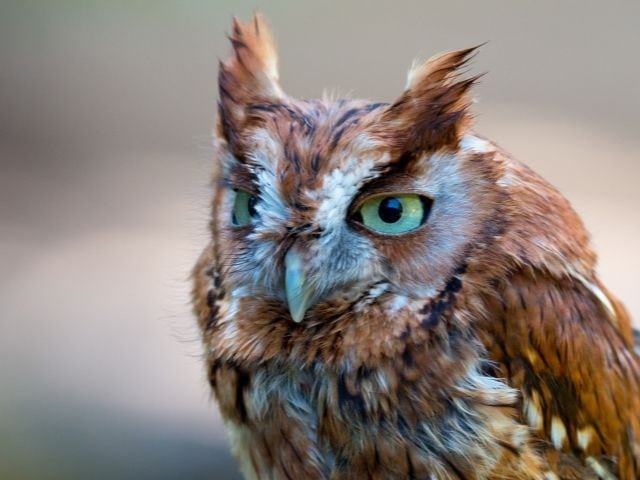
- Length: 6.3 to 9.8 inches
- Wingspan: 19.8 to 24 inches
- Weight: 121 to 244 grams
One of the smallest owls in the state, Eastern Screech Owls are also the most common Michigan Owls.
These midget owls can be found in abundance throughout the state, except in Northern Michigan. And they aren't shy either. Screech owls make a home in trees with cavities and even in unexpected nest sites, like street lamps and high foot traffic walkways.
They are also known as "Miniature Great Horned Owls" because of their resemblance, but their resilience is a similar trait.
A surefire way to tell there's one nearby is to listen for the trilling call that sounds like a horse whinnying:
Eastern Screech Owls would readily move into nest boxes 10-30 feet up in a live tree or pole.
3. Barn Owl
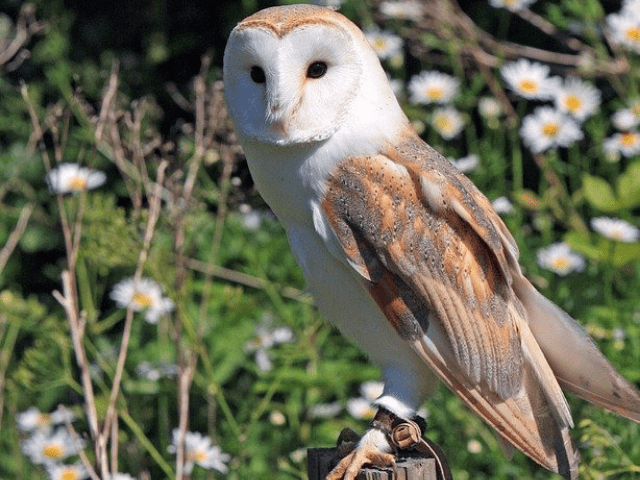
- Length: 12.6 to 15.8 inches
- Wingspan: 39.4 to 49.2 inches
- Weight: 400 to 700 grams
Despite being the most widespread owls on the planet, Barn Owls are a rare sight in Michigan.
There's a high chance of spotting Barn Owls in Southern Michigan or from the south of Detroit.
Michigan's severe winters also contribute to the Barn Owl's endangered population in the state.
Even though they're rare, Barn Owls have an unmistakable appearance among Michigan owls. They have a white heart-shaped face and underbelly that gives them a ghostly appearance. Their buff back plumage is also unlike what you'd see in any other owl.
Furthermore, Barn Owls sound different. They give a discernible high-pitched screech in flight.
4. Barred Owl
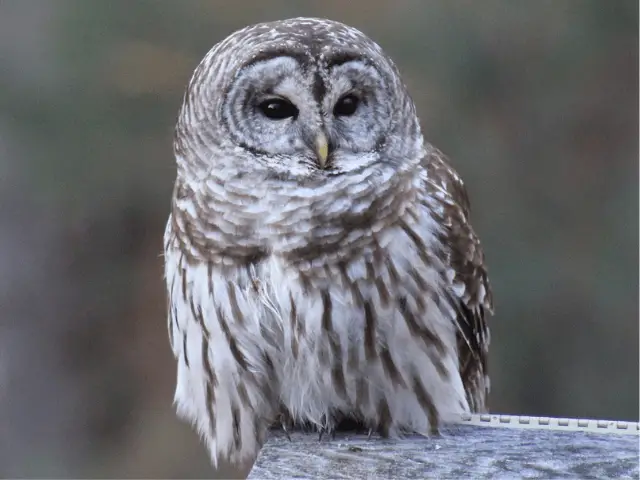
- Length: 16.9 to 19.7 inches
- Wingspan: 39 to 43.3 inches
- Weight: 470 to 1050 grams
Unlike the Barn Owl, Barred Owls are much more popular in the Great Lake State - heads-up, don't mix up their names.
While they're common, don't expect to see them out in the open, like hawks or other raptors.
If you scan trees in their territory properly, you sure will find one roosting on a tree branch looking back at you.
Moreover, these owls are known to respond swiftly to playback recordings of their "Who cooks for you?" call.
Here’s what this Michigan owl sounds like:
They are also quite vocal even during the day. And especially from January to Mid-April when they're looking for mates.
5. Short-Eared Owl
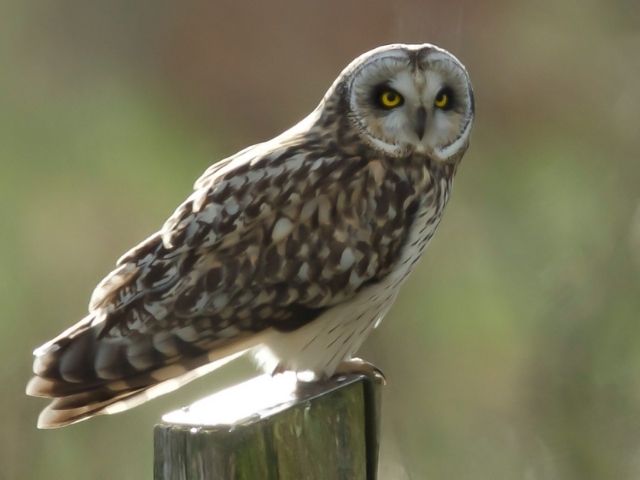
- Length: 13.4 to 16.9 inches
- Wingspan: 33.5 to 40.5 inches
- Weight: 206 to 475 grams
The Short-eared Owl is a migrant Michigan Owl with distinct black-rimmed eyes.
Short-eared Owls come from their breeding ground in the far north to settle across the nation.
These owls may be endangered species in Michigan, but you'll find them in certain places at certain times.
You just have to know the places to look, and I'll show you where. What are birders for? 😉
They are grassland species that lurk in between thickets, meadows, marshes, and bogs. Unfortunately, these habitats have taken a sharp decline in the state.
Regardless, Short-eared Owls have a more reliable range in southern Michigan.
Perhaps also in the northern half during the breeding season. One was spotted by a photographer inside a small village in Elkton.
Here's a Short-eared Owl in all its glory:
6. Long-Eared Owl
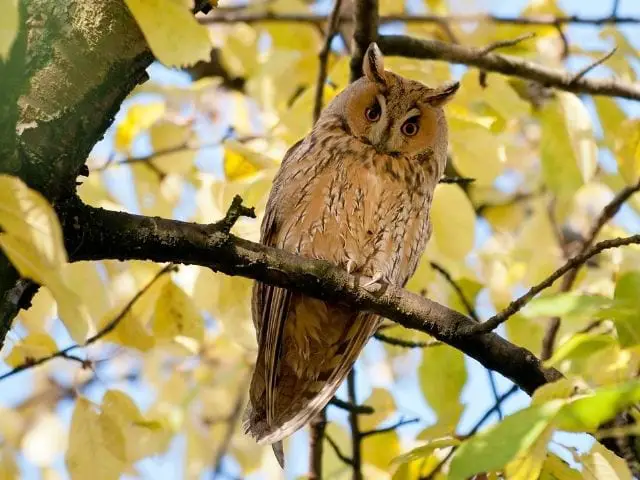
- Length: 13.8 to 15.8 inches
- Wingspan: 35.4 to39.4 inches
- Weight: 220 to 435 grams
Long-eared owls are the cat owls of Michigan. Not only do they look like one, but they also sound like a cat looking for a mate.
They are native to the Wolverine State and are year-round occupants of the northern and central parts. But folks in the southern half have also spotted these elusive owls during the breeding season in spring.
That's right. Long-eared owls may have a distinct look, but they don't give themselves up easily.
7. Northern Saw-whet Owl
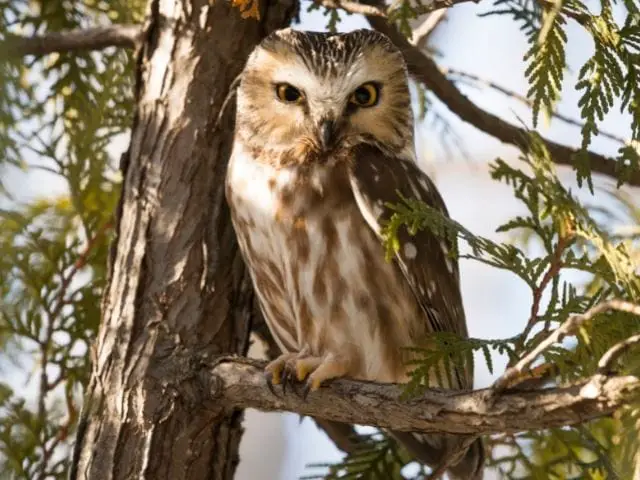
- Length: 7.1 to 8.3 inches
- Wingspan: 16.5 to 18.9 inches
- Weight: 65 to 151 grams
Saw-whets are officially the smallest owl species in Michigan. They are just about the size of Robins, but unlike Robins, they are incredibly hard to spot.
So much so that their population estimate in the state is unconfirmed. But rest assured that they're in abundance.
In riparian forests where they roost, they sit at eye-level near tree trunks and watch passersby. But it's not uncommon to see them in city parks and urban areas.
Northern Saw-whet Owls might be one of the smallest raptors in the country, but they have the same diet as the bigger birds, only with smaller prey.
Did you know: Northern Saw-whet Owls get their name from sounding like a saw being sharpened on a whetstone.
But I believe this Michigan Owl hoots more like a beeper:
Fun Fact: Owls are often seen as enigmatic creatures of the night. If you are interested to learn more about their role in folklore and tradition, then read our article entitled, "Owl Symbolism And Spirit Animal".
8. Great Gray Owl
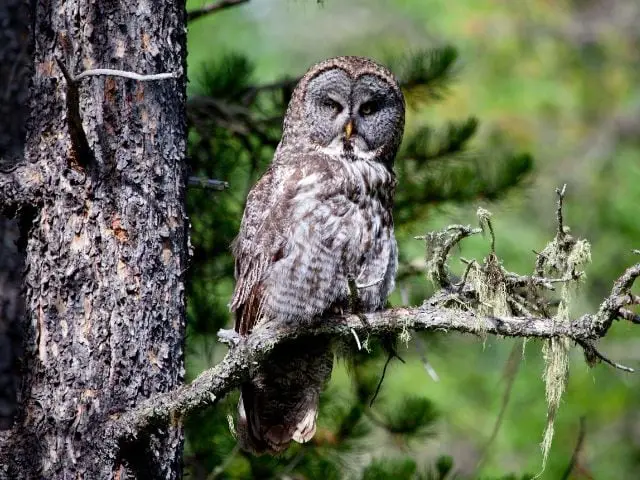
- Length: 24 to 33.1 inches
- Wingspan: 53.9 to 60.2 inches
- Weight: 700 to 1700 grams
Great Gray Owls are the tallest owls in North America and are highly sought after by Michigan birdwatchers.
It's almost impossible not to recognize Great Grays with their oversized round heads and silvery gray plumage. When one's discovered, you'll find crowds trooping into the area - Snowy Owls have a similar status in the state.
Why?
Michigan is one of the few states where they can be found in the country. These large owls typically occupy the northern borders and the Eastern Upper Peninsula of Michigan (as do the rarer owl species in Michigan).
Funny enough, it's folks who aren't looking that get to discover these enormous avian predators first.
9. Snowy Owl
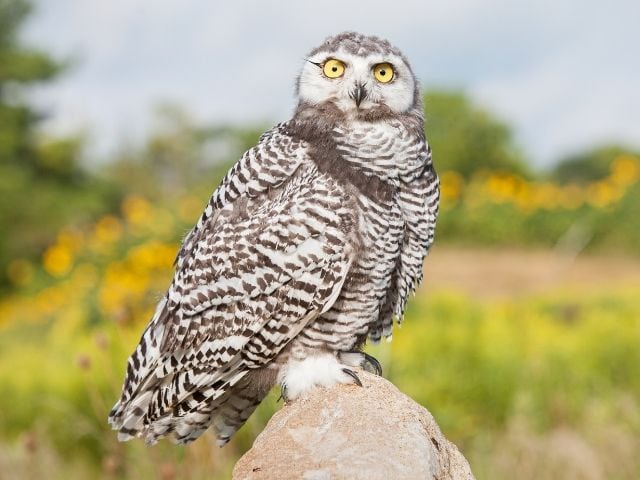
- Length: 20.5 to 27.9 inches
- Wingspan: 49.6 to 57.1 inches
- Weight: 1600 to 2950 grams
Snowy Owls are easily the most beautiful birds on the planet. It's not just because they're the actors of Hedwig (Harry Potter's pet owl), but their mesmerizing snow-white feathers and bulgy yellow eyes.
Their range is uncertain but spreads across the state when they troop in during winter months from the treeless Arctic Tundra where they breed.
Snowy Owls, like Short-eared Owls, are ground-dwelling, so you'll likely see them on the snow in open fields and near river banks.
10. Northern Hawk Owl
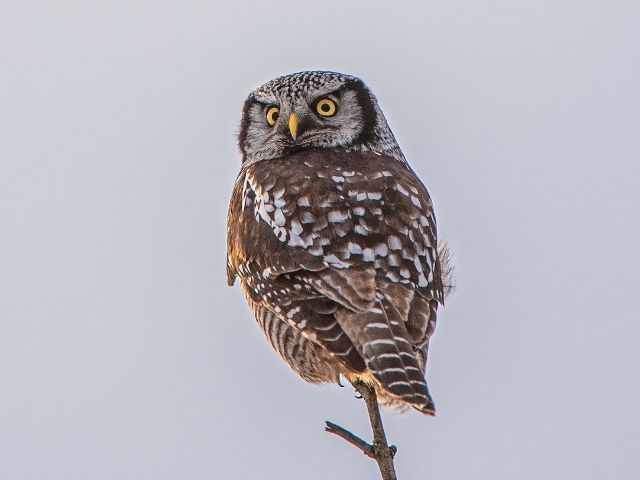
- Length: 14.2 to 17.7 inches
- Wingspan: 27.9 inches
- Weight: 240 to 454 grams
As you've guessed, these owls behave like hawks and act like hawks. They have short, pointed wings and tails, which is unlike other owls. Also, they are primarily active during the day.
But they aren't impossible to see either if you know where to look.
Northern Hawk Owls prefer open forests or marshy areas with coniferous trees, such as spruce. More particularly, these owls have been spotted in Dryburgh and Trout Lake, Michigan.
More reliably, you can join birders who troop in to see the Northern Hawk Owls and other amazing bird species at Eastern Upper Peninsula in the winter months.
Listen for their unconventional "ulululululul" rolling call that lasts about 14 seconds.
Fun Fact: We keep on mentioning the owls' hoots and variations but never about the reason! Proceed by reading the article, "Why Do Owls Hoot?" and know why they do this!
Frequently Asked Questions (FAQ)
What Kind of Owls Live in Michigan?
As stated in detail in the earlier part of this article, there are ten (10) kinds of owls living in Michigan, namely:
- Great Horned Owl
- Eastern Screech-Owls
- Barred Owl
- Great Gray Owl
- Northern Saw-whet Owl
- Short-eared Owl
- Long-eared Owl
- Barn Owl
- Snowy Owl
- Northern Hawk Owl
What is the largest owl in Michigan?
The Great Gray Owl is the largest (tallest) in Michigan by height and wingspan. They dwarf the great horned by as much as 10 inches and have a 3-inch longer wingspan. However, Great Horned Owls are larger by size. Female adults typically weigh over 5 pounds, while the largest Great Gray only scrapes the 4-pound mark. On the other hand, our winter visitors, Snowy Owls, can weigh over 6 pounds.
How do you attract owls in Michigan?
The best way to attract owls is to install a properly-sized nest box in a quiet and suitable (like an abandoned barn for Barn Owls) location. Also, you can leave patches of bush overgrown and tree branches unpruned to give them a home and hunting ground.
Where to find owls in Michigan?
Owls live close to farmlands, marshes, woodlots, and open fields where rodents, squirrels, ducks, geese, and various birds abound. They can also be found in urban and suburban locations with a similar ecosystem as mentioned above. Look in parks, cemeteries, and woods, with big trees where they can roost without disturbance.
When do owls mate in Michigan?
Most Owl species in Michigan begin mating during spring. A pair of owls are known to mate for life and use the same nest each year.
Watch the courtship and mating process of a pair of Great Horned Owls below:
Wrapping Up
Michigan welcomes more owls than most states in the U.S.
The tallest of them all, the sedentary Great Gray Owl, is a rare but spectacular sight if you get to see one. But the ferocious Great Horned Owls are our largest native owls and much easier to see.
Hopefully, you now have a good night's sleep knowing that you figured out the mystery owl in your neighborhood.
And if you're looking to attract a breeding pair to your property, perhaps your yard, install an appropriate nest box.

